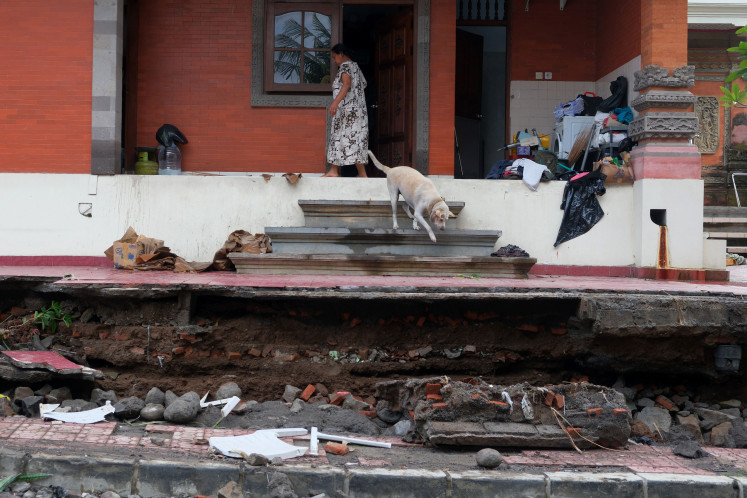Popular Reads
Top Results
Can't find what you're looking for?
View all search resultsPopular Reads
Top Results
Can't find what you're looking for?
View all search resultsThe dilemma of energy subsidies
Low international oil prices over the past three years have greatly helped President Joko “Jokowi” Widodo to maintain prudent fiscal management, enabling him to slash fuel energy by one-third only one month after his inauguration in October 2014, and invest the annual savings of US$15 billion in infrastructure development
Change text size
Gift Premium Articles
to Anyone
L
ow international oil prices over the past three years have greatly helped President Joko “Jokowi” Widodo to maintain prudent fiscal management, enabling him to slash fuel energy by one-third only one month after his inauguration in October 2014, and invest the annual savings of US$15 billion in infrastructure development.
Given the high volatility of oil prices and Indonesia’s position as a net oil importer with a daily import need of more than 800,000 barrels of oil (bbl), the period of low oil prices (below $50/bbl), which lasted until the end of 2017, has indeed been highly fortuitous for the Jokowi administration.
But the oil factor has now increasingly become a dilemma, both politically and economically, as oil prices have been hovering above $60 since early this year and seem most likely to rise steadily. A prudent fiscal rule would require the government to raise fuel prices to cap the energy subsidy this year, which was set at Rp 95 trillion ($7 billion), on the assumption that oil prices for the whole year will average $48/bbl.
But increasing energy (fuel, electricity and liquefied petroleum gas) prices could be political suicide for the government in view of the general and presidential elections in April, 2019.
Economically, raising fuel prices also could strengthen inflationary pressures and cause instability, as the rupiah would depreciate and the central bank may have to raise its rate, especially as we are now facing a big risk of a sudden reverse capital flow due to the planned increase in the US Fed fund rate four more times this year.
In facing this dilemma, the government understandably decided to choose the politically safest alternative, though imprudent in terms of fiscal and energy policy. Finance Minister Sri Mulyani Indrawati announced on Tuesday the government would instead increase energy subsidies to maintain energy prices until 2019.
True, the government still has fiscal space to raise the budget deficit from as high as 2.2 percent of gross domestic product (GDP), as set in the 2018 state budget, to a level close to the 3 percent threshold allowed by the State Finances Law.
Several analysts estimate that the government would be able to weather the impact of oil price rises until as high as $75/bbl. Stress tests by analysts last year showed that each $1 rise above the assumed oil price would also increase state revenue by Rp 700 billion, but a $20 rise over the assumed oil price would require additional subsidies of Rp 11.70 trillion.
The problem, though, is that no one is able to accurately predict international oil price movements even just for a one-year period. But however understandable the government policy of increasing the budgetary allocation for energy subsidies may be, doing nothing to cap fuel subsidies would damage the credibility of the energy policy and the government commitment to reform, and may lower the government’s credit rating from its investment grade now.
Allowing energy subsidies to balloon again until next year could even plant a fiscal time bomb for the next president who, by all political prognoses now, could again be Jokowi.










